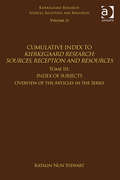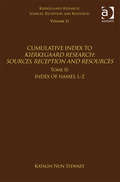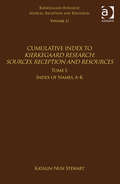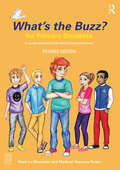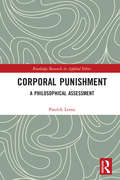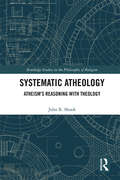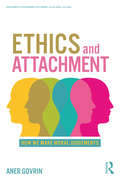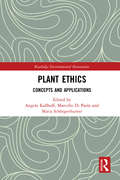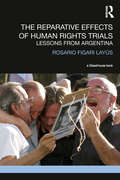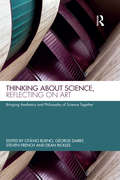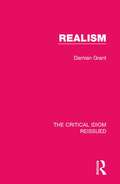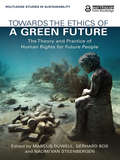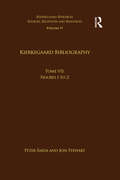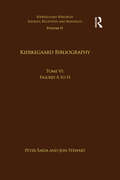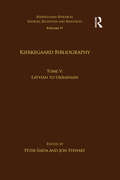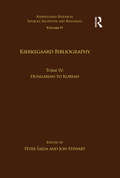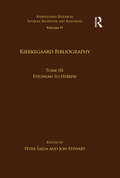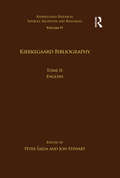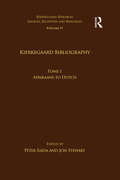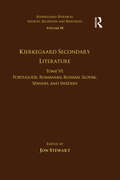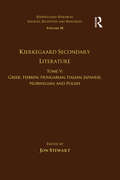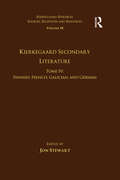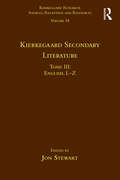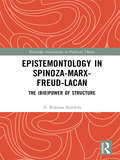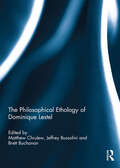- Table View
- List View
Volume 21, Tome III: Index of Subjects, Overview of the Articles in the Series (Kierkegaard Research: Sources, Reception and Resources)
by Katalin Nun StewartThis last volume of Kierkegaard Research: Sources, Reception and Resources is a cumulative index to all the volumes of the series. The series was originally designed in a systematic fashion in order to make it as easily usable and accessible as possible. The individual parts of the series and the individual volumes have been organized to make it generally fairly simple to locate the main articles relevant for one’s research interests. However, the placement of some individual articles might not always be completely self-evident. Moreover, the sheer mass of material and information provided by the series makes a cumulative index a necessary accompanying resource. Further, given the scope of the series, it was inevitable that some names or topics are mentioned more than once in the series in different places beyond the main article ostensibly dedicated to them. The purpose of these indices is thus to help the readers to find an easy and direct way to the topics of their interest in the rich universe of Kierkegaard research. The material of the indices is divided into three tomes: Tome I is the Index of Names from A to K, Tome II covers the Index of Names from L to Z, while Tome III consists of the Index of Subjects and includes a complete overview of all the volumes, tomes and articles of the series.
Volume 21, Tome II: Index of Names, L-Z (Kierkegaard Research: Sources, Reception and Resources)
by Katalin Nun StewartThis last volume of Kierkegaard Research: Sources, Reception and Resources is a cumulative index to all the volumes of the series. The series was originally designed in a systematic fashion in order to make it as easily usable and accessible as possible. The individual parts of the series and the individual volumes have been organized to make it generally fairly simple to locate the main articles relevant for one’s research interests. However, the placement of some individual articles might not always be completely self-evident. Moreover, the sheer mass of material and information provided by the series makes a cumulative index a necessary accompanying resource. Further, given the scope of the series, it was inevitable that some names or topics are mentioned more than once in the series in different places beyond the main article ostensibly dedicated to them. The purpose of these indices is thus to help the readers to find an easy and direct way to the topics of their interest in the rich universe of Kierkegaard research. The material of the indices is divided into three tomes: Tome I is the Index of Names from A to K, Tome II covers the Index of Names from L to Z, while Tome III consists of the Index of Subjects and includes a complete overview of all the volumes, tomes and articles of the series.
Volume 21, Tome I: Index of Names, A-K (Kierkegaard Research: Sources, Reception and Resources)
by Katalin Nun StewartThis last volume of Kierkegaard Research: Sources, Reception and Resources is a cumulative index to all the volumes of the series. The series was originally designed in a systematic fashion in order to make it as easily usable and accessible as possible. The individual parts of the series and the individual volumes have been organized to make it generally fairly simple to locate the main articles relevant for one’s research interests. However, the placement of some individual articles might not always be completely self-evident. Moreover, the sheer mass of material and information provided by the series makes a cumulative index a necessary accompanying resource. Further, given the scope of the series, it was inevitable that some names or topics are mentioned more than once in the series in different places beyond the main article ostensibly dedicated to them. The purpose of these indices is thus to help the readers to find an easy and direct way to the topics of their interest in the rich universe of Kierkegaard research. The material of the indices is divided into three tomes: Tome I is the Index of Names from A to K, Tome II covers the Index of Names from L to Z, while Tome III consists of the Index of Subjects and includes a complete overview of all the volumes, tomes and articles of the series.
What's the Buzz? for Primary Students: A Social and Emotional Enrichment Programme
by Mark Le Messurier Madhavi Nawana ParkerWhat’s the Buzz? is an internationally renowned series of programmes designed to help children and young people develop social and emotional awareness. Now available in a revised second edition, What’s the Buzz for Primary Students is a sixteen-lesson programme targeting everyday social challenges faced by primary aged children, such as peer pressure and bullying style behaviours; competition and handling disappointment; feelings and wellbeing and self-awareness. Each lesson is designed around the SAFE criteria (Sequenced; Active; Focused; Explicit) and includes: A new and beautifully illustrated ‘Archie’ story, in which the popular character faces a new and relatable social challenge A series of lively and exciting games and activity suggestions Role-plays and discussion points so that children can put their skills into practice in a supportive environment Having already proven to appeal to teachers and support staff, counsellors and psychologists worldwide, this resource is suitable for anybody looking to enrich the social lives of children. Resources and training modules to support this book can be found on the website www.whatsthebuzz.net.au.
Corporal Punishment: A Philosophical Assessment (Routledge Research in Applied Ethics)
by Patrick LentaThe aim of this book is to assess the moral permissibility of corporal punishment and to enquire into whether or not it ought to be legally prohibited. Against the widespread view that corporal punishment is morally legitimate and should be legally permitted provided it falls short of abuse, Patrick Lenta argues that all corporal punishment, even parental spanking, is morally impermissible and ought to be legally proscribed. The advantages claimed for corporal punishment over alternative disciplinary techniques, he contends, are slight or speculative and are far outweighed by its disadvantages. He presents, in addition, a rights-based case against corporal punishment, arguing that children possess certain fundamental rights that all corporal punishment of them violates, namely the right to security of the person and the right not to be subjected to degrading punishment. Lenta’s approach is unique in that it engages with empirical literature in the social sciences in order to fully examine the emotional and psychological effects of corporal punishment on children. Corporal Punishment: A Philosophical Assessment is a philosophically rigorous and engaging treatment of a hitherto neglected topic in applied ethics and social philosophy.
Systematic Atheology: Atheism’s Reasoning with Theology (Routledge Studies in the Philosophy of Religion)
by John R. ShookAtheology is the intellectual effort to understand atheism, defend the reasonableness of unbelief, and support nonbelievers in their encounters with religion. This book presents a historical overview of the development of atheology from ancient thought to the present day. It offers in-depth examinations of four distinctive schools of atheological thought: rationalist atheology, scientific atheology, moral atheology, and civic atheology. John R. Shook shows how a familiarity with atheology’s complex histories, forms, and strategies illuminates the contentious features of today’s atheist and secularist movements, which are just as capable of contesting each other as opposing religion. The result is a book that provides a disciplined and philosophically rigorous examination of atheism’s intellectual strategies for reasoning with theology. Systematic Atheology is an important contribution to the philosophy of religion, religious studies, secular studies, and the sociology and psychology of nonreligion.
Ethics and Attachment: How We Make Moral Judgments (Philosophy and Psychoanalysis)
by Aner GovrinWhy are we disgusted when an elderly woman is robbed but sympathize with the actions of a Robin Hood? Why do acts of cruelty against a helpless kitten bother us more than does the trampling of ants? In Ethics and Attachment: How We Make Moral Judgments, psychoanalyst and philosopher Aner Govrin offers the attachment approach to moral judgment, an innovative new model of the process involved in making such moral judgments. Drawing on clinical findings from psychoanalysis, neuroscience and developmental psychology, the author argues that infants' experience in the first year of life provides them with the basic tools needed to reach complex moral judgments later in life. With reference to Winnicott and Bowlby, the author examines how attachments affect our abilities to apply to make moral decisions. With its wholly new ideas about moral judgments, Ethics and Attachment will be of great interest to ethics and moral philosophy scholars, law students, and psychoanalytic psychotherapists.
Plant Ethics: Concepts and Applications (Routledge Environmental Humanities)
by Angela Kallhoff, Marcello Di Paola and Maria SchörgenhumerLarge parts of our world are filled with plants, and human life depends on, interacts with, affects and is affected by plant life in various ways. Yet plants have not received nearly as much attention from philosophers and ethicists as they deserve. In environmental philosophy, plants are often swiftly subsumed under the categories of "all living things" and rarely considered thematically. There is a need for developing a more sophisticated theoretical understanding of plants and their practical role in human experience. Plant Ethics: Concepts and Applications aims at opening a philosophical discussion that may begin to fill that gap. The book investigates issues in plants ontology, ethics and the role of plants and their cultivation in various fields of application. It explores and develops important concepts to shape and frame plants-related philosophical questions accurately, including new ideas of how to address moral questions when confronted with plants in concrete scenarios. This edited volume brings together for the first time, and in an interdisciplinary spirit, contemporary approaches to plant ethics by international scholars of established reputation. It will be of great interest to students and scholars of Philosophy and Ethics.
The Reparative Effects of Human Rights Trials: Lessons From Argentina
by Rosario Figari LayusJustice in domestic courts is one of the most prominent aims of victims seeking to obtain accountability for human rights violations. It is, however, also one of the most difficult to achieve. In many Latin American countries, as well as elsewhere, activists have put human rights prosecutions forward as a fundamental means to end impunity, build democracy, strengthen the rule of law and address victims’ rights. But there is still little knowledge about what actually happens when these judicial mechanisms are effectively put to work. Can prosecutions of mass human rights violations contribute to overcome the effects of state violence and impunity? Can trials enable meaningful reparative changes for victims in their local contexts? Analysing the human rights trials in Argentina established to prosecute those responsible for human rights violations during the military dictatorship, this book addresses how and why domestic prosecutions can operate as a means for reparation and contribute to dealing with the damage caused by crimes against humanity. Based on a series of interviews conducted with victims participating in these prosecutions, as well as with lawyers, prosecutors, judges and other relevant actors in five provinces of Argentina, this book will be of considerable interest to those studying and working in the interdisciplinary field of transitional justice and human rights. The PhD thesis on which this book was based was awarded with the 2016 Doctoral Studies Award of the Philipps University of Marburg in Germany.
Thinking about Science, Reflecting on Art: Bringing Aesthetics and Philosophy of Science Together
by Otávio Bueno Dean Rickles Steven French George DarbyThinking about Science, Reflecting on Art: Bringing Aesthetics and Philosophy of Science Together is the first book to systematically examine the relationship between the philosophy of science and aesthetics. With contributions from leading figures from both fields, this edited collection engages with such questions as: Does representation function in the same way in science and in art? What important characteristics do scientific models share with literary fictions? What is the difference between interpretation in the sciences and in the arts? Can there be a science of aesthetics? In what ways can aesthetics and philosophy of science be integrated? Aiming to develop the interconnections between the philosophy of science and the philosophy of art more broadly and more deeply than ever before, this volume not only explores scientific representation by comparison with fiction but extends the scope of interaction to include metaphysical and other questions around methodology in mainstream philosophy of science, including the aims of science, the characterisation of scientific understanding, and the nature of observation, as well as drawing detailed comparisons between specific examples in both art and the sciences.
Realism (The Critical Idiom Reissued #8)
by Damian GrantFirst published in 1970, this book provides an introduction to literary realism. After considering what realism is and its philosophical roots, it goes on to examine the emergence of the idea of realism in nineteenth-century France and its gradual spread across the wider republic of letters. This work will be of interest to those studying nineteenth-century European literature.
Towards the Ethics of a Green Future: The Theory and Practice of Human Rights for Future People (Routledge Studies in Sustainability)
by Gerhard Bos Marcus Düwell Naomi Van SteenbergenWhat are our obligations towards future generations who stand to be harmed by the impact of today’s environmental crises? This book explores ecological sustainability as a human rights issue and examines what our long-term responsibilities might be. This interdisciplinary collection of chapters provides a basis for understanding the debates on the provision of sustainability for future generations from a diverse set of theoretical standpoints. Covering a broad range of perspectives such as risk and uncertainty, legal implementation, representation, motivation and economics, Towards the Ethics of a Green Future sets out the key questions involved in this complex ethical issue. The contributors bring theoretical discussions to life through the use of case studies and real-world examples. The book also includes clear and tangible recommendations for policymakers on how to put the suggestions proposed within the book into practice. This book will be of great interest to all researchers and students concerned with issues of sustainability and human rights, as well as scholars of environmental politics, law and ethics more generally.
Volume 19, Tome VII: Figures I to Z (Kierkegaard Research: Sources, Reception and Resources)
by Jon Stewart Peter ŠajdaThe long tradition of Kierkegaard studies has made it impossible for individual scholars to have a complete overview of the vast field of Kierkegaard research. The large and ever increasing number of publications on Kierkegaard in the languages of the world can be simply bewildering even for experienced scholars. The present work constitutes a systematic bibliography which aims to help students and researchers navigate the seemingly endless mass of publications. The volume is divided into two large sections. Part I, which covers Tomes I-V, is dedicated to individual bibliographies organized according to specific language. This includes extensive bibliographies of works on Kierkegaard in some 41 different languages. Part II, which covers Tomes VI-VII, is dedicated to shorter, individual bibliographies organized according to specific figures who are in some way relevant for Kierkegaard. The goal has been to create the most exhaustive bibliography of Kierkegaard literature possible, and thus the bibliography is not limited to any specific time period but instead spans the entire history of Kierkegaard studies.
Volume 19, Tome VI: Figures A to H (Kierkegaard Research: Sources, Reception and Resources)
by Jon Stewart Peter ŠajdaThe long tradition of Kierkegaard studies has made it impossible for individual scholars to have a complete overview of the vast field of Kierkegaard research. The large and ever increasing number of publications on Kierkegaard in the languages of the world can be simply bewildering even for experienced scholars. The present work constitutes a systematic bibliography which aims to help students and researchers navigate the seemingly endless mass of publications. The volume is divided into two large sections. Part I, which covers Tomes I-V, is dedicated to individual bibliographies organized according to specific language. This includes extensive bibliographies of works on Kierkegaard in some 41 different languages. Part II, which covers Tomes VI-VII, is dedicated to shorter, individual bibliographies organized according to specific figures who are in some way relevant for Kierkegaard. The goal has been to create the most exhaustive bibliography of Kierkegaard literature possible, and thus the bibliography is not limited to any specific time period but instead spans the entire history of Kierkegaard studies.
Volume 19, Tome V: Latvian to Ukrainian (Kierkegaard Research: Sources, Reception and Resources)
by Jon Stewart Peter ŠajdaThe long tradition of Kierkegaard studies has made it impossible for individual scholars to have a complete overview of the vast field of Kierkegaard research. The large and ever increasing number of publications on Kierkegaard in the languages of the world can be simply bewildering even for experienced scholars. The present work constitutes a systematic bibliography which aims to help students and researchers navigate the seemingly endless mass of publications. The volume is divided into two large sections. Part I, which covers Tomes I-V, is dedicated to individual bibliographies organized according to specific language. This includes extensive bibliographies of works on Kierkegaard in some 41 different languages. Part II, which covers Tomes VI-VII, is dedicated to shorter, individual bibliographies organized according to specific figures who are in some way relevant for Kierkegaard. The goal has been to create the most exhaustive bibliography of Kierkegaard literature possible, and thus the bibliography is not limited to any specific time period but instead spans the entire history of Kierkegaard studies.
Volume 19, Tome IV: Hungarian to Korean (Kierkegaard Research: Sources, Reception and Resources)
by Jon Stewart Peter ŠajdaThe long tradition of Kierkegaard studies has made it impossible for individual scholars to have a complete overview of the vast field of Kierkegaard research. The large and ever increasing number of publications on Kierkegaard in the languages of the world can be simply bewildering even for experienced scholars. The present work constitutes a systematic bibliography which aims to help students and researchers navigate the seemingly endless mass of publications. The volume is divided into two large sections. Part I, which covers Tomes I-V, is dedicated to individual bibliographies organized according to specific language. This includes extensive bibliographies of works on Kierkegaard in some 41 different languages. Part II, which covers Tomes VI-VII, is dedicated to shorter, individual bibliographies organized according to specific figures who are in some way relevant for Kierkegaard. The goal has been to create the most exhaustive bibliography of Kierkegaard literature possible, and thus the bibliography is not limited to any specific time period but instead spans the entire history of Kierkegaard studies.
Volume 19, Tome III: Estonian to Hebrew (Kierkegaard Research: Sources, Reception and Resources)
by Jon Stewart Peter ŠajdaThe long tradition of Kierkegaard studies has made it impossible for individual scholars to have a complete overview of the vast field of Kierkegaard research. The large and ever increasing number of publications on Kierkegaard in the languages of the world can be simply bewildering even for experienced scholars. The present work constitutes a systematic bibliography which aims to help students and researchers navigate the seemingly endless mass of publications. The volume is divided into two large sections. Part I, which covers Tomes I-V, is dedicated to individual bibliographies organized according to specific language. This includes extensive bibliographies of works on Kierkegaard in some 41 different languages. Part II, which covers Tomes VI-VII, is dedicated to shorter, individual bibliographies organized according to specific figures who are in some way relevant for Kierkegaard. The goal has been to create the most exhaustive bibliography of Kierkegaard literature possible, and thus the bibliography is not limited to any specific time period but instead spans the entire history of Kierkegaard studies.
Volume 19, Tome II: English (Kierkegaard Research: Sources, Reception and Resources)
by Jon Stewart Peter ŠajdaThe long tradition of Kierkegaard studies has made it impossible for individual scholars to have a complete overview of the vast field of Kierkegaard research. The large and ever increasing number of publications on Kierkegaard in the languages of the world can be simply bewildering even for experienced scholars. The present work constitutes a systematic bibliography which aims to help students and researchers navigate the seemingly endless mass of publications. The volume is divided into two large sections. Part I, which covers Tomes I-V, is dedicated to individual bibliographies organized according to specific language. This includes extensive bibliographies of works on Kierkegaard in some 41 different languages. Part II, which covers Tomes VI-VII, is dedicated to shorter, individual bibliographies organized according to specific figures who are in some way relevant for Kierkegaard. The goal has been to create the most exhaustive bibliography of Kierkegaard literature possible, and thus the bibliography is not limited to any specific time period but instead spans the entire history of Kierkegaard studies.
Volume 19, Tome I: Afrikaans to Dutch (Kierkegaard Research: Sources, Reception and Resources)
by Jon Stewart Peter ŠajdaThe long tradition of Kierkegaard studies has made it impossible for individual scholars to have a complete overview of the vast field of Kierkegaard research. The large and ever increasing number of publications on Kierkegaard in the languages of the world can be simply bewildering even for experienced scholars. The present work constitutes a systematic bibliography which aims to help students and researchers navigate the seemingly endless mass of publications. The volume is divided into two large sections. Part I, which covers Tomes I-V, is dedicated to individual bibliographies organized according to specific language. This includes extensive bibliographies of works on Kierkegaard in some 41 different languages. Part II, which covers Tomes VI-VII, is dedicated to shorter, individual bibliographies organized according to specific figures who are in some way relevant for Kierkegaard. The goal has been to create the most exhaustive bibliography of Kierkegaard literature possible, and thus the bibliography is not limited to any specific time period but instead spans the entire history of Kierkegaard studies.
Volume 18, Tome VI: Portuguese, Romanian, Russian, Slovak, Spanish, and Swedish (Kierkegaard Research: Sources, Reception and Resources)
by Jon StewartIn recent years interest in the thought of Kierkegaard has grown dramatically, and with it the body of secondary literature has expanded so quickly that it has become impossible for even the most conscientious scholar to keep pace. The problem of the explosion of secondary literature is made more acute by the fact that much of what is written about Kierkegaard appears in languages that most Kierkegaard scholars do not know. Kierkegaard has become a global phenomenon, and new research traditions have emerged in different languages, countries, and regions. The present volume is dedicated to trying to help to resolve these two problems in Kierkegaard studies. Its purpose is, first, to provide book reviews of some of the leading monographic studies in the Kierkegaard secondary literature so as to assist the community of scholars to become familiar with the works that they have not read for themselves. The aim is thus to offer students and scholars of Kierkegaard a comprehensive survey of works that have played a more or less significant role in the research. Second, the present volume also tries to make accessible many works in the Kierkegaard secondary literature that are written in different languages and thus to give a glimpse into various and lesser-known research traditions. The six tomes of the present volume present reviews of works written in Catalan, Chinese, Czech, Danish, Dutch, English, Finnish, French, Galician, German, Greek, Hebrew, Hungarian, Italian, Japanese, Norwegian, Polish, Portuguese, Romanian, Russian, Slovak, Spanish, and Swedish.
Volume 18, Tome V: Greek, Hebrew, Hungarian, Italian, Japanese, Norwegian, and Polish (Kierkegaard Research: Sources, Reception and Resources)
by Jon StewartIn recent years interest in the thought of Kierkegaard has grown dramatically, and with it the body of secondary literature has expanded so quickly that it has become impossible for even the most conscientious scholar to keep pace. The problem of the explosion of secondary literature is made more acute by the fact that much of what is written about Kierkegaard appears in languages that most Kierkegaard scholars do not know. Kierkegaard has become a global phenomenon, and new research traditions have emerged in different languages, countries, and regions. The present volume is dedicated to trying to help to resolve these two problems in Kierkegaard studies. Its purpose is, first, to provide book reviews of some of the leading monographic studies in the Kierkegaard secondary literature so as to assist the community of scholars to become familiar with the works that they have not read for themselves. The aim is thus to offer students and scholars of Kierkegaard a comprehensive survey of works that have played a more or less significant role in the research. Second, the present volume also tries to make accessible many works in the Kierkegaard secondary literature that are written in different languages and thus to give a glimpse into various and lesser-known research traditions. The six tomes of the present volume present reviews of works written in Catalan, Chinese, Czech, Danish, Dutch, English, Finnish, French, Galician, German, Greek, Hebrew, Hungarian, Italian, Japanese, Norwegian, Polish, Portuguese, Romanian, Russian, Slovak, Spanish, and Swedish.
Volume 18, Tome IV: Finnish, French, Galician, and German (Kierkegaard Research: Sources, Reception and Resources)
by Jon StewartIn recent years interest in the thought of Kierkegaard has grown dramatically, and with it the body of secondary literature has expanded so quickly that it has become impossible for even the most conscientious scholar to keep pace. The problem of the explosion of secondary literature is made more acute by the fact that much of what is written about Kierkegaard appears in languages that most Kierkegaard scholars do not know. Kierkegaard has become a global phenomenon, and new research traditions have emerged in different languages, countries, and regions. The present volume is dedicated to trying to help to resolve these two problems in Kierkegaard studies. Its purpose is, first, to provide book reviews of some of the leading monographic studies in the Kierkegaard secondary literature so as to assist the community of scholars to become familiar with the works that they have not read for themselves. The aim is thus to offer students and scholars of Kierkegaard a comprehensive survey of works that have played a more or less significant role in the research. Second, the present volume also tries to make accessible many works in the Kierkegaard secondary literature that are written in different languages and thus to give a glimpse into various and lesser-known research traditions. The six tomes of the present volume present reviews of works written in Catalan, Chinese, Czech, Danish, Dutch, English, Finnish, French, Galician, German, Greek, Hebrew, Hungarian, Italian, Japanese, Norwegian, Polish, Portuguese, Romanian, Russian, Slovak, Spanish, and Swedish.
Volume 18, Tome III: English L-Z (Kierkegaard Research: Sources, Reception and Resources)
by Jon StewartIn recent years interest in the thought of Kierkegaard has grown dramatically, and with it the body of secondary literature has expanded so quickly that it has become impossible for even the most conscientious scholar to keep pace. The problem of the explosion of secondary literature is made more acute by the fact that much of what is written about Kierkegaard appears in languages that most Kierkegaard scholars do not know. Kierkegaard has become a global phenomenon, and new research traditions have emerged in different languages, countries and regions. The present volume is dedicated to trying to help to resolve these two problems in Kierkegaard studies. Its purpose is, first, to provide book reviews of some of the leading monographic studies in the Kierkegaard secondary literature so as to assist the community of scholars to become familiar with the works that they have not read for themselves. The aim is thus to offer students and scholars of Kierkegaard a comprehensive survey of works that have played a more or less significant role in the research. Second, the present volume also tries to make accessible many works in the Kierkegaard secondary literature that are written in different languages and thus to give a glimpse into various and lesser-known research traditions. The six tomes of the present volume present reviews of works written in Catalan, Chinese, Czech, Danish, Dutch, English, Finnish, French, Galician, German, Greek, Hebrew, Hungarian, Italian, Japanese, Norwegian, Polish, Portuguese, Romanian, Russian, Slovak, Spanish, and Swedish.
Epistemontology in Spinoza-Marx-Freud-Lacan: The (Bio)Power of Structure (Routledge Innovations in Political Theory)
by A. Kiarina KordelaA. Kiarina Kordela steps beyond extant commentaries on Marx’s theory of commodity fetishism—from A. Sohn-Rethel to L. Althusser, É. Balibar, Slavoj Žižek, and others—to show that in capitalism value is the manifestation of the homology between thought and being, while their other aspect—power—is foreclosed and becomes the object of biopower. Using monistic Marxian/Lacanian structuralism as an alternative to dominant models from Plato and Kant to phenomenological accounts, deconstruction, and other contemporary approaches, Kordela expertly argues that Marx’s theory of commodity fetishism is a reformulation of the Spinozian thesis that thought (mind) and things (bodies or extension) are manifestations of one and the same being or substance. Kordela’s link between Spinoza and Marx shows that being consists of two aspects, value and power, the former leading to structuralist thought, the latter becoming the object of contemporary biopower. Epistemontology in Spinoza-Marx-Freud-Lacan intervenes between two dominant lines of thought in the reception of Marx today: on the one hand, an approach that relates Marxian thought to psychoanalysis from a Hegelian/dialectical perspective and, on the other hand, an approach that links Marxism to Spinozian monism, at the total exclusion of psychoanalysis.This book will interest scholars and researchers who study Marxism, (post)structuralism, psychoanalysis, critical theory, ontology, epistemology and theories of representation, theoreticians of cultural studies and comparative literature, aesthetic theory, including the relation of art to economy and politics, and biopolitics.
The Philosophical Ethology of Dominique Lestel (Angelaki: New Work in the Theoretical Humanities)
by Matthew Chrulew, Jeffrey Bussolini and Brett BuchananDominique Lestel is a French philosopher whose work is significant for the rethinking of animality and human-animal relations. Throughout such important books as L’Animalité (1996), Les Origines animales de la culture (2001) and L’Animal singulier (2004), he offers a fierce critique of reductive, mechanistic models of animal behaviour, as well as a positive contribution to etho-ethnographic and phenomenological methods for understanding animal life. Centred around hybrid human–animal communities of shared interests, affects and meaning, his critical and speculative approach to the animal sciences offers a vision of animals as acting subjects and bearers of culture, who form their own worlds and transform them in concert with human and other partners. In tracing the ways in which we share our lives with animals in the texture of animality, Lestel’s cutting-edge philosophical ethology also contributes to an overarching philosophical anthropology of the human as the most animal of animals. This book was originally published as a special issue of Angelaki: Journal of the Theoretical Humanities.
